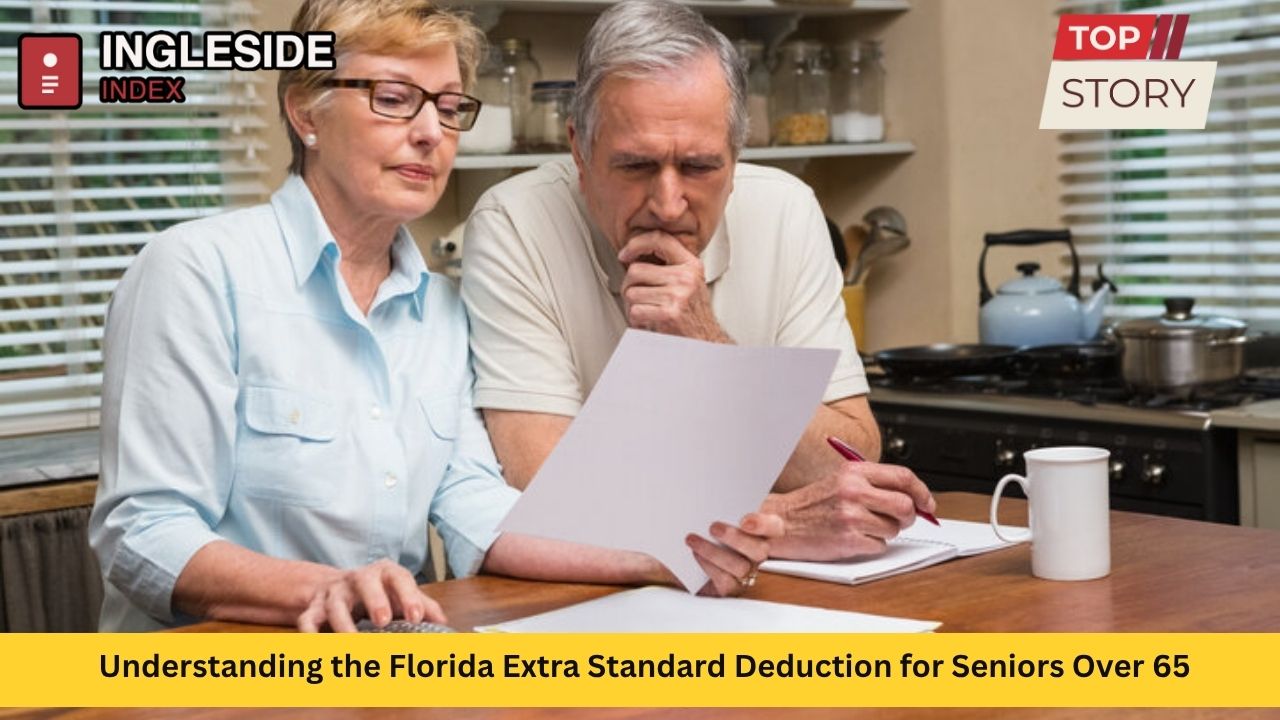Florida’s warm climate, abundant sunshine, and vibrant communities have made it a top choice for retirees. But beyond the beaches and palm trees, the Sunshine State offers important tax benefits that attract and support its senior residents, including an extra standard deduction for those over 65. Understanding this deduction is crucial for retirees and anyone assisting them in navigating their financial future in Florida.
Overview of Florida’s Tax Environment
Florida is well-known for its retirement-friendly tax policies. Unlike many other states, Florida has:
-
No state income tax, meaning residents keep more of their earned and retirement income.
-
No estate or inheritance tax, making it attractive for preserving generational wealth.
-
Property tax benefits for seniors, lowering the overall housing cost burden.
Major cities such as Miami, Tampa, Orlando, Jacksonville, and Fort Lauderdale all benefit from the state’s consistent tax laws. Whether you’re living in bustling Miami or a quieter city like Gainesville, the state’s senior tax policies apply uniformly.
While the absence of state income tax is a major draw, many seniors may not realize that property tax savings are also substantial, thanks to additional deductions and exemptions.
The Advantage of the Extra Standard Deduction
The extra standard deduction for seniors over 65 focuses primarily on property taxes, thanks to various homestead exemption enhancements available to older adults.
What Is the Homestead Exemption in Florida?
The homestead exemption reduces the taxable value of your primary residence, effectively lowering the property taxes you owe. Every Florida homeowner can receive an exemption of up to $50,000 on their home’s assessed value. But if you’re 65 or older, you may qualify for even bigger savings.
The Senior Additional Homestead Exemption
If you are 65 or older, meet certain income requirements, and own a home classified as your permanent residence, you may be eligible for an additional homestead exemption of up to $50,000. The amount and rules can vary by county and city, but every major city—including Jacksonville, Tampa, Miami, and Orlando—offers some version of this exemption.
Example: Miami-Dade County
Miami-Dade provides an additional $50,000 exemption for qualifying seniors. The requirements include annual household income limits (which are subject to change annually) and residency throughout the year.
Example: Tampa (Hillsborough County)
Here, seniors over 65 enjoy an extra $50,000 exemption, along with a “long-term residency” requirement. This means you must have lived in your home for at least 25 years, with a property value within certain limits, to receive a further exemption that could result in almost full relief from county taxes on the homesteaded portion.
Orlando (Orange County) and Others
The senior exemption applies similarly across Orlando, St. Petersburg, and Fort Lauderdale, with occasional differences in income thresholds or residency requirements.
How Does the Extra Deduction Work?
This deduction reduces the assessed value of your property, thereby lowering your property tax bill. It’s important for seniors (and their families) to:
-
Apply annually for the senior exemption, as it’s not automatically renewed in most places.
-
Submit proof of age and income, such as tax returns or Social Security statements.
-
Make note of county-specific deadlines, usually falling between March and April.
Key Requirements and Steps to Claim Your Deduction
Age and Residency
-
You must be at least 65 years old as of January 1 of the tax year for which you’re applying.
-
The property must be your permanent residence.
Income Limits
-
Income limits are set annually by the Florida Department of Revenue and adjust with inflation.
-
For example, in recent years, the household adjusted gross income limit has hovered around $35,000–$35,300, but this figure changes each year.
Application Process
-
Complete and submit a senior exemption application to your county property appraiser.
-
Attach all required documentation, including income verification and proof of age.
-
Check if your city or county requires additional information or documentation—some, like Tallahassee or Sarasota, may have extra forms.
Renewal
-
While the standard homestead exemption usually auto-renews, the senior additional exemption often requires annual reapplication with fresh income verification.
The Financial Impact for Seniors
Example: Savings in Jacksonville
Let’s say a Jacksonville homeowner over 65 qualifies for the full additional exemption and their home is assessed at $200,000:
-
Homestead exemption: Reduces assessed value by $50,000.
-
Senior exemption: Further reduces it by another $50,000 (subject to local limits).
-
Net taxable value: $100,000 instead of $200,000.
If Jacksonville’s property tax millage rate is around $10 per $1,000 of taxable value, that could mean saving approximately $1,000 annually, or even more for long-term residents who qualify for additional breaks.
Statewide Impact
Tens of thousands of Floridians benefit from this deduction each year. In cities with higher property values such as Miami or Naples, the dollar savings can be even more significant, providing vital budget relief for retirees on fixed incomes.
Why Florida Created This Additional Deduction
Florida’s population is steadily aging, with more than 4.5 million residents 65 or older. Cities such as Venice, Naples, and The Villages boast some of the highest proportions of seniors in the United States. The extra deduction:
-
Recognizes the importance of keeping property taxes manageable for those on pensions or Social Security.
-
Helps seniors stay in their homes longer, supporting community stability.
-
Acts as an incentive for retirees to make Florida their permanent residence, fueling local economies.
How the Florida Senior Standard Deduction Compares Nationally
While Florida offers extra property tax relief for seniors, other states take different approaches:
-
New York and California provide sliding-scale property tax exemptions with stricter income limits.
-
Texas offers a ceiling on school property tax for homeowners over 65, but with fewer overall exemptions.
-
Some states offset income taxes for seniors rather than property taxes.
Florida’s mix of zero income tax and generous property tax exemptions makes its offering especially attractive nationally.
Other Tax Benefits for Florida Seniors
Florida’s extra standard deduction is only one part of a suite of tax-friendly benefits, including:
-
Social Security and pension income not being taxed at the state level.
-
Additional local property tax reductions for widows/widowers and disabled veterans.
-
Portability of the homestead exemption, allowing retirees in cities like Tampa or Orlando to move nearby without losing their tax benefit.
Tips for Maximizing the Benefit
-
Consult your local property appraiser’s office (found in city halls in places like Fort Lauderdale, St. Petersburg, or Tallahassee) for the latest application forms and deadlines.
-
Keep thorough records of household income each year to ensure you don’t miss the income cutoff.
-
Explore whether your city or county offers special “limited income” or “long-term residency” exemptions for seniors.
Scenarios: City-by-City in Florida
Miami
A retiree living in downtown Miami, after applying the standard and senior homestead exemptions, could see thousands in property tax savings each year, important for managing the higher cost of living.
St. Petersburg
Known for its robust retirement communities, St. Petersburg’s senior exemption program helps seniors maintain financial independence and stay in their homes.
Naples
With some of the highest property values in Florida and a large senior population, even incremental tax savings can make a significant difference for retirees.
Tallahassee
The state capital offers programs specifically for long-term residents over 65, making it easier for seniors with decades of homeownership to benefit.
Frequently Asked Questions
Is this deduction only available in certain cities?
No, the Florida extra standard deduction for seniors over 65 is available in every county and city. However, each locality manages the exemption, and details can differ, so it’s important to check with your local property appraiser.
Does this deduction impact my federal taxes?
No, Florida’s homestead and senior exemptions are for state and local property taxes only. They do not affect your federal income tax filings.
Can both spouses claim the exemption if only one is over 65?
Generally, if one co-owner of a primary residence qualifies, the exemption can be applied, but it’s best to check local regulations for specific scenarios involving marital or joint ownership.
Do renters qualify for this deduction?
No, the Florida extra standard deduction for seniors over 65 is only for homeowners with eligible permanent residences.
What if I move to a new city within Florida?
You may be able to transfer your homestead status (homestead portability), but you must reapply for all exemptions in your new location.
Common Mistakes to Avoid
-
Not reapplying annually when required, which can result in losing the exemption.
-
Failing to submit proof of income or correct documentation.
-
Missing the deadline for application—usually around March 1 each year. Late applications typically aren’t accepted, so mark your calendar!
When to Consult a Professional
If your finances are complex or you’re unsure whether you qualify, consider consulting:
-
A certified public accountant familiar with Florida’s property tax laws.
-
The property appraiser’s office in your county (based in offices across all major cities, such as Miami, Tampa, Orlando, and Jacksonville).
Summary
Florida’s extra standard deduction for seniors over 65 is a vital financial resource that keeps housing affordable for retirees across the state, from Miami’s urban condos to Cape Coral’s waterfront homes. By lowering the taxable value of primary residences, seniors enjoy tangible savings that can contribute to a higher quality of life and financial security.
Understanding and properly applying for these exemptions ensures that Florida’s older residents can stay in their homes, remain active in their communities, and enjoy all the retirement benefits this state is known for.
If you or a loved one may be eligible, reach out to your local property appraiser’s office and start preparing your application as soon as possible. With a little planning, Florida’s tax-friendly environment can make your golden years truly shine.











Leave a Comment